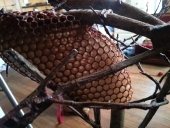




 1
1




When you reach your lowest point, you are open to the greatest change.
-Avatar Aang
 4
4








Om is where the heart is.




Come join me at www.peacockorchard.com
 2
2




Moderator, Treatment Free Beekeepers group on Facebook.
https://www.facebook.com/groups/treatmentfreebeekeepers/









 1
1




Tomorrow doesn’t exist and never will. There is only the eternal now. Do it now.
 2
2




A build too cool to miss:Mike's GreenhouseA great example:Joseph's Garden
All the soil info you'll ever need:
Redhawk's excellent soil-building series





 2
2




Ahmet Oguz Akyuz wrote: I was wondering if you can recommend some good books about raising bees.
'What we do now echoes in eternity.' Marcus Aurelius
How Permies Works Dr. Redhawk's Epic Soil Series

|
To avoid criticism do nothing, say nothing, be nothing. -Elbert Hubbard. Please critique this tiny ad:
permaculture bootcamp - gardening gardeners; grow the food you eat and build your own home
https://permies.com/wiki/bootcamp
|




